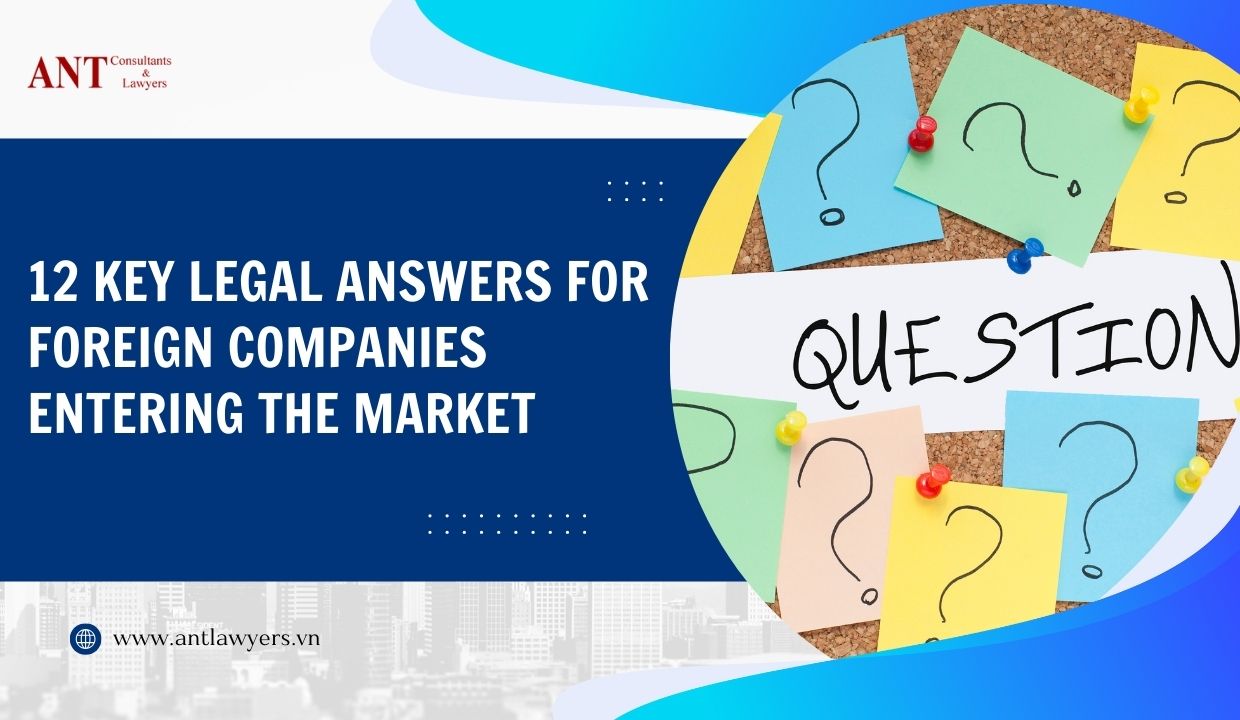The Employment in Vietnam Guide: 12 Key Legal Answers for Foreign Companies Entering the Market


Foreign companies entering Vietnam’s thriving market face unique legal questions, especially around employing local talents. Understanding Vietnam labor laws has become more important because in general the labor law leans toward more protection for the employee.
In this employment in Vietnam guide, we will give some idea to 12 of the most pressing questions foreign companies have when searching employment laws in Vietnam. From work permits to wage requirements, this guide offers insights to prevent costly compliance mistakes and ensure a smooth process to start a business in Vietnam.
Employment Contracts: Building a Legal Foundation
Question: A well-structured employment contract is the key of any employment relationship in Vietnam. Foreign companies often ask, What are the mandatory terms for employment contracts?
Answer: In Vietnam, employment contracts must include details about job title, job location, working hours, wages, job description, duration, and termination conditions. Contracts must be in Vietnamese (or bilingual, with Vietnamese as the official version) and can be either fixed-term, indefinite-term, or seasonal. Importantly, probation periods cannot exceed 60 days for specialized roles or 30 days for other positions, per the Employment in Vietnam Guide to avoid compliance issues.
Tip: For fixed-term contracts, renewals are generally limited to two terms before the contract must become indefinite, creating stability in employee tenure.
Wages and Benefits: Understanding Vietnamese Requirements
Question: Foreign companies new to Vietnam may wonder, What are the minimum wage requirements?
Answer: Minimum wages vary by region and are updated annually. Currently, Vietnam’s minimum wage is divided into four regions, with urban centers like Ho Chi Minh City and Hanoi commanding higher rates. Employers must also pay mandatory insurance and allowances, covering health insurance, social insurance, and unemployment insurance for employees. The Employment in Vietnam Guide emphasizes the importance of adhering to these wage and benefit guidelines to avoid penalties.
Additional Insight: Special wage rates apply for overtime, night shifts, and holiday work, calculated as a multiple of the regular rate.
Work Permits and Visas: Essential for Foreign Workers
Question: Foreign companies often need expatriate expertise. A key question is, What are the requirements for obtaining work permits?
Answer: For non-Vietnamese employees, a work permit is mandatory unless they fall into an exempt category (such as specific investors). The process involves employer sponsorship, proof of qualifications, and health checks. Permits are typically valid for two years and need renewal upon expiration. Staying compliant with the work permit requirements under this Employment in Vietnam Guide can ensure smooth employee onboarding.
Pro-Tip: Start early—obtaining a work permit can take 30-45 days, and compliance is strictly enforced.
Working Hours and Leave: What Employers Must Know
Question: Foreign companies may ask, What are the standard working hours, and how does leave policy work?
Answer: The standard workweek in Vietnam is 48 hours, though some companies cap it at 40 hours. Overtime is limited to 200 hours annually, with a possible extension up to 300 hours in specific industries. Paid leave includes 12 days annually, increasing by one day every five years of service, plus 10 public holidays. Employers must track leave accurately, as per the Employment in Vietnam Guide, to avoid discrepancies and employee dissatisfaction.
Reminder: Sick leave, maternity leave, and other specific leaves are protected under Vietnamese law, and employer non-compliance can lead to penalties.
Taxation and Social Insurance: Staying Compliant
Question: Understanding Vietnam’s tax and social insurance obligations is crucial. Employers often ask, What taxes and contributions are required?
Answer: Employers must withhold personal income tax (PIT) for all employees, including foreign staff, based on a progressive rate. Social insurance contributions cover health, social, and unemployment insurance (with employer contributions being the larger portion). This Employment in Vietnam Guide advises foreign companies to work closely with Vietnamese tax consultants to navigate complex PIT regulations and avoid fines.
Important Note: Social insurance contributions are capped and adjusted annually, making updates crucial for compliance.
Termination and Severance: Avoiding Costly Errors
Question: Termination policies can be challenging, and companies often ask, What is required when ending an employment relationship?
Answer: Termination grounds include resignation, mutual agreement, and dismissal due to disciplinary issues or economic reasons. A notice period of 30-45 days (depending on contract type) is standard, and employees are often entitled to severance pay. Following the Employment in Vietnam Guide will help ensure that termination procedures comply with Vietnamese law, preventing potential disputes and penalties.
Tip: Employers must document all aspects of the termination process to avoid legal complications later.
Compliance with Labor Laws: A Foreign Employer’s Checklist
Question: Compliance with local labor regulations is crucial for foreign companies. Employers may ask, What reporting and record-keeping requirements exist?
Answer: Employers must submit labor usage reports and maintain detailed employee records, including contract terms, payroll data, and social insurance contributions. Regular labor audits are recommended to avoid penalties. The Employment in Vietnam Guide outlines these compliance practices, helping foreign companies understand Vietnam’s rigorous reporting standards.
Advice: Assign a local compliance officer or hire an external consultant to keep labor records accurate and up-to-date.
Trade Unions: Adapting to Vietnam’s Labor Dynamics
Question: Foreign companies often question, Are trade unions required?
Answer: In Vietnam, employees have the right to form or join trade unions, and companies with trade unions must engage in collective bargaining. Under the Employment in Vietnam Guide, employers are advised to cooperate with unions, as they play a significant role in employment relations and may influence workplace policies and labor disputes.
Strategy: Develop a clear policy for union interactions to build a positive employer-employee relationship.
Health and Safety: Legal Requirements for Employers
Question: What are health and safety obligations for employers?
Answer: Health and safety standards in Vietnam are enforced by law and tailored to protect workers, especially in industries with higher risk levels. Foreign companies must provide safety training, maintain equipment, and comply with accident reporting protocols. Non-compliance can lead to penalties, making it essential for foreign companies to follow the health standards outlined in this Employment in Vietnam Guide.
Best Practice: Regular safety audits and employee training programs can help ensure compliance and foster a safer workplace.
Data Protection: Employee Privacy Laws
Question: How does data protection impact employee information?
Answer: Employers must follow strict data protection practices for handling personal employee data, including payroll and employment records. The Employment in Vietnam Guide highlights the importance of securing sensitive information to avoid breaches and potential fines.
Pro-Tip: Implement data protection policies aligned with international standards, as Vietnam is strengthening its data privacy laws.
Non-Compete Clauses: Protecting Your Business Interests
Question: Are non-compete clauses enforceable in Vietnam?
Answer: While non-compete clauses are permissible, they are subject to scrutiny, especially regarding duration and scope. In general, clauses should be reasonable and limited to protect legitimate business interests. Following this Employment in Vietnam Guide can help foreign companies create enforceable, compliant non-compete agreements.
Advice: Consult local legal experts to ensure that non-compete agreements are enforceable and comply with Vietnamese labor laws.
Dispute Resolution: Handling Employment Conflicts
Question: What options exist for resolving labor disputes?
Answer: Vietnam offers mediation, and court litigation for resolving employment disputes. Employers are encouraged to settle disputes amicably, often with the help of mediators. The Employment in Vietnam Guide advises foreign companies to engage in alternative dispute resolution methods where possible, as they are typically faster and less confrontational than court cases.
Suggestion: Build dispute resolution clauses into employment contracts to clarify procedures and minimize conflicts.
Final Thoughts
Navigating employment regulations in Vietnam can seem complex for foreign companies, but understanding key legal requirements is essential to building a compliant, effective workforce. This Employment in Vietnam Guide serves as a resource for foreign employers, offering clarity on the questions most commonly asked by new market entrants. With Vietnam’s dynamic labor landscape, adhering to these guidelines can help foreign businesses avoid common pitfalls and establish a strong presence in this promising market
About ANT Lawyers, a Law Firm in Vietnam
We help clients overcome cultural barriers and achieve their strategic and financial outcomes, while ensuring the best interest rate protection, risk mitigation and regulatory compliance. ANT lawyers has lawyers in Ho Chi Minh city, Hanoi, and Danang, and will help customers in doing business in Vietnam.


Stay Ahead of Employment Regulations with Diligent Labor Law Firms in Vietnam


7 Pivotal Amendments: Enhancing Vietnam Employment Regulations for Economic Resilience
7 Crucial Steps to Sue the Employer in Vietnam for Unlawful Termination
10 Critical Facts You Must Know About Termination of Employment Contract Without Reason in Vietnam
How ANT Lawyers Could Help Your Business?
You could learn more about ANT Lawyers Employment or contact our Law Firm in Vietnam for advice via email ant@antlawyers.vn or call our office at (+84) 24 730 86 529
Recent Posts
5 Powerful Reasons Why Vietnam Digital Asset Sandbox Is a Bold and Hopeful Move for Innovation
Change is fast. Rules are slow. But innovation can’t wait. As digital assets grow, so…
4 Critical Steps to Effectively Terminate The Employment Contracts with Confidence and Compassion
To terminate the employment contracts can be a complex and often sensitive process, especially when…
8 Insights from a Due Diligence Attorneys in Vietnam for Successful M&A Deals
Navigating the complex landscape of mergers and acquisitions (M&A) in Vietnam can be a daunting…
What 7 Crucial Truths About Arbitration in Vietnam Every Foreign Company Must Know Today?
Let's face the fact, as business owners or directors, would you normally look at dispute…
7 Crucial Legal Challenges Fintech Law Firms in Vietnam Can Help You Overcome for Business Success
Vietnam’s fintech sector is experiencing rapid growth, catching up with the trend of digital financial…
7 Reasons to Set Up a Subsidiary in Vietnam Now: A Powerful and Timely Move Amid Global Shifts
Introduction: The World Is Changing Fast, So Should Your Strategy When the world becomes unpredictable,…

